Contact center of the Ukrainian Judiciary 044 207-35-46
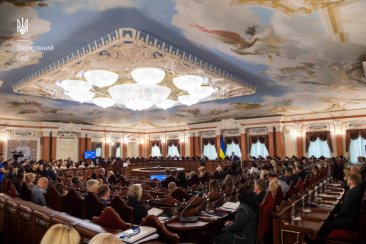
During the first discussion panel, the conference participants discussed the judicial practice of resolving private law disputes related to the war.
Moderating the discussion, Judge of the Grand Chamber of the Supreme Court Olha Stupak noted that everyone is aware that the war in Ukraine did not begin on 24 February 2022, but much earlier, and it has been going on for more than 10 years. And the first cases related to the armed aggression of the Russian Federation were considered by civil courts. These were cases involving citizens' claims for damages for property destroyed as a result of armed aggression, compensation for non-pecuniary damage, etc. Therefore, the first session of the event was dedicated to discussing the issues of private law disputes related to the war.
Oleh Tkachuk, Judge of the Grand Chamber of the Supreme Court, focused his speech on the issues of judicial protection of people's right to compensation for damage caused by Russian aggression.
The speaker cited the practice of the Civil Cassation Court of the Supreme Court, according to which the responsibility for violation of human and civil rights and freedoms defined by the Constitution and laws of Ukraine in the temporarily occupied territories lies with the Russian Federation as an occupying power in accordance with the norms and principles of international law.
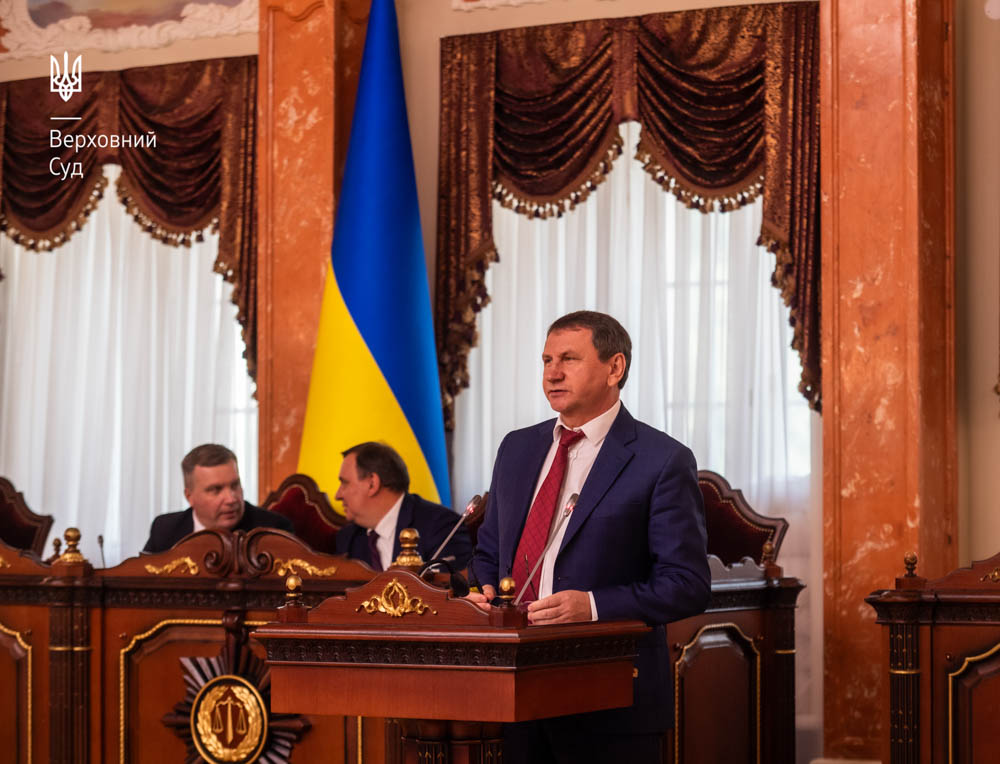
At the same time, Mr. Tkachuk highlighted the Supreme Court's legal opinions on the protection of the rights of people who have moved from the Russian-occupied territories of Ukraine, compensation for property or reimbursement of the value of property lost as a result of the war, and also recalled the position on the judicial immunity of the aggressor state, which is reflected in a number of Supreme Court resolutions.
In his speech, the judge analysed, among other things, the resolutions of the Grand Chamber of the Supreme Court, which set out conclusions on compensation for non-pecuniary damage caused by the death of a relative in connection with the war and compensation for the value of property mobilised or expropriated for defence purposes.
The presentation by Oleh Tkachuk is available at https://supreme.court.gov.ua/userfiles/media/new_folder_for_uploads/supreme/2024_prezent/Prezent_sud_zah_prava_na_vidshkod_skodu_20_09_2024.pdf.
Nataliia Sakara, Judge of the Civil Cassation Court of the Supreme Court, focused primarily on the Supreme Court's case law on establishing facts that can be established in civil proceedings. This includes, in particular, the fact of a person's death as a result of Russia's armed aggression against Ukraine, forced relocation from the occupied territory of Ukraine, marriage registration, birth or death in the temporarily occupied territory, dependency on a deceased serviceman, etc.
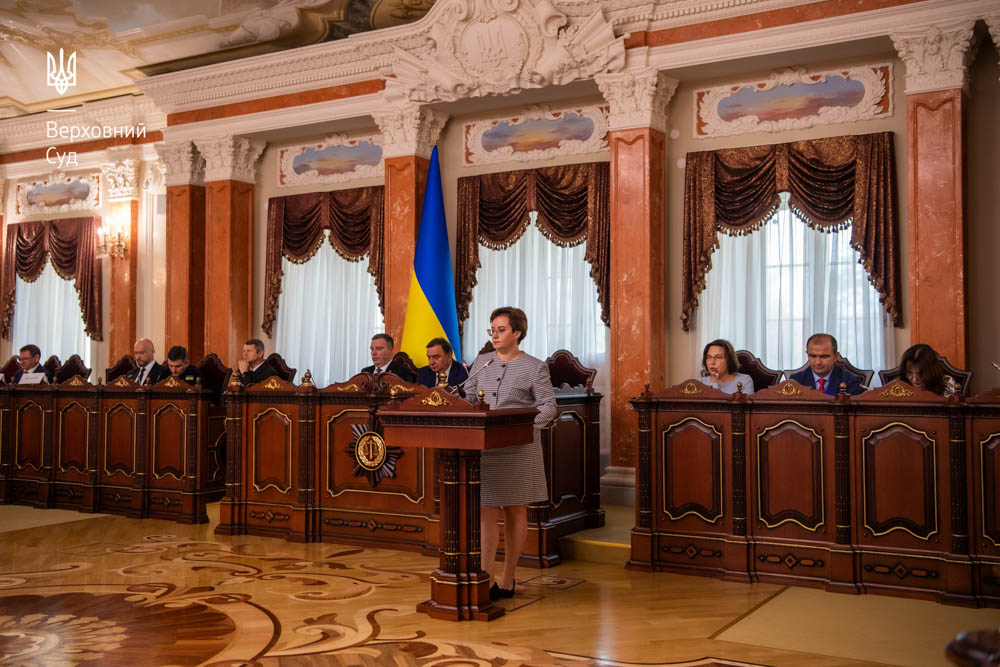
At the same time, Nataliia Sakara emphasised that the facts of being in captivity, raising a child on their own, refusing to receive a one-time financial assistance in connection with the death of a serviceman, providing constant care for a person who needs social care services for health reasons, being excluded from military registration, and the fact that a person is not liable for military service are not subject to judicial review.
For more details, see Nataliia Sakara's presentation: https://supreme.court.gov.ua/userfiles/media/new_folder_for_uploads/supreme/2024_prezent/Prezent_Zabezpech_prava_na_dostup_do_pravosud_20_09_2024.pdf.
Oleksandr Banasko, Judge of the Grand Chamber of the Supreme Court, spoke about the jurisprudence of commercial courts in cases of compensation for damage caused as a result of armed aggression against Ukraine.
The speaker outlined the main legal acts in force regulating compensation for loss of property, damage and loss of profit for property lost or damaged as a result of hostilities.
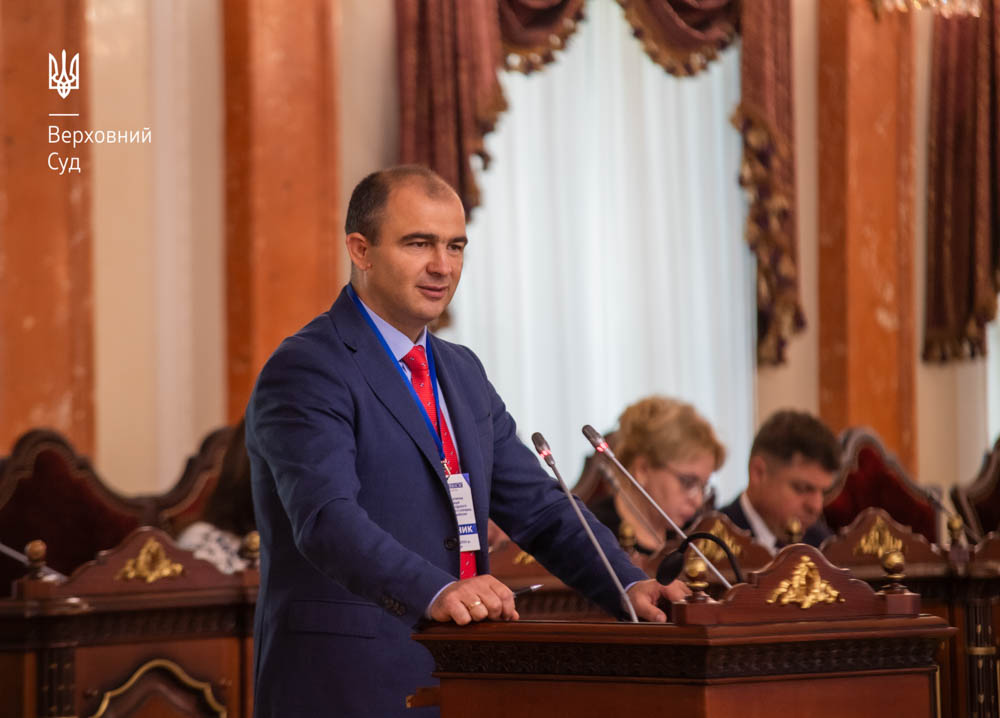
Oleksandr Banasko also drew attention to the most problematic issues of the application of procedural law in this category of disputes, in particular, the determination of the subject matter jurisdiction of cases brought by a private legal entity against a foreign aggressor state for compensation of material and non-material damage caused to a business entity by damage to its property, pointing out that such disputes are considered by commercial courts.
The judge reviewed the case law on the territorial jurisdiction for filing a claim for damages at the place where the damage occurred, in accordance with part 8 of Article 29 of the Commercial Procedural Code of Ukraine, and on filing a claim at the place where the defendant's property is located.
In addition, Oleksandr Banasko analysed the approaches that have developed in the practice of commercial courts for determining the proper defendant and reported on the peculiarities and methods of notifying the parties to the case in this category of disputes.
The presentation by Oleksandr Banasko is available at https://supreme.court.gov.ua/userfiles/media/new_folder_for_uploads/supreme/2024_prezent/Prezent_vidshkod_shkod_20_09_2024.pdf.
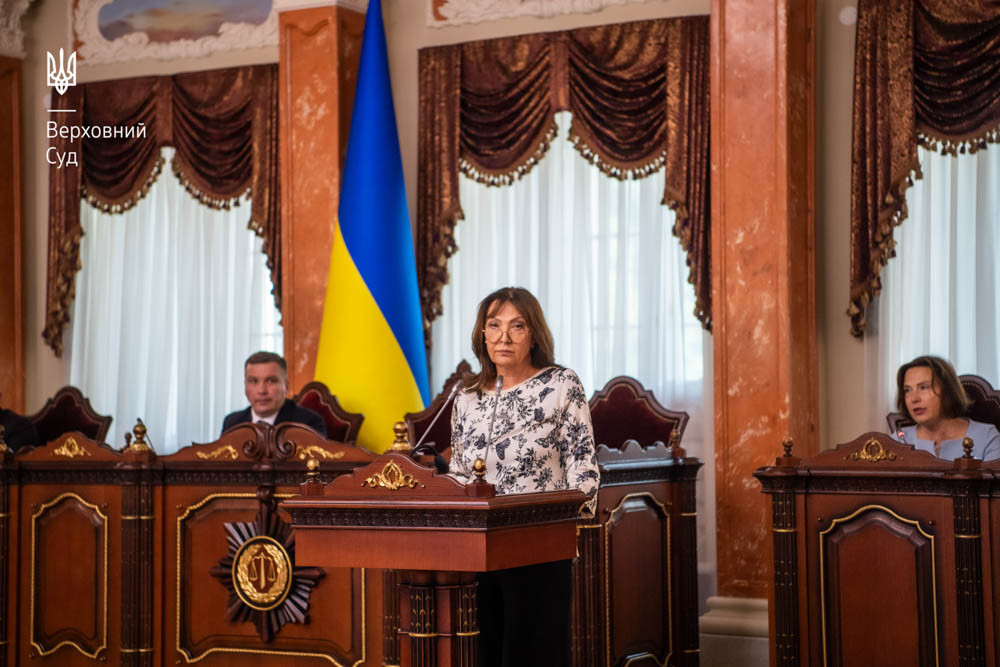
Natalia Volkovytska, Judge of the Commercial Cassation Court of the Supreme Court, focused on certain issues arising in the practice of commercial jurisdiction in war-related cases. She analysed the Supreme Court's case law on:
The presentation of Natalia Volkovytska is available by the link: https://supreme.court.gov.ua/userfiles/media/new_folder_for_uploads/supreme/2024_prezent/Prezent_prakt_gosp_jurisd_viina_20_09_2024.pdf.
Oleksii Maslov, Attorney at Law, Member of the Board of the Ukrainian Arbitration Association, Fellow of the Chartered Institute of Arbitrators, presented the Recommendations on the issues of compliance with procedural standards in cases where the Russian Federation is a defendant, developed by the Ukrainian Arbitration Association jointly with the Institute of Legislative Ideas.
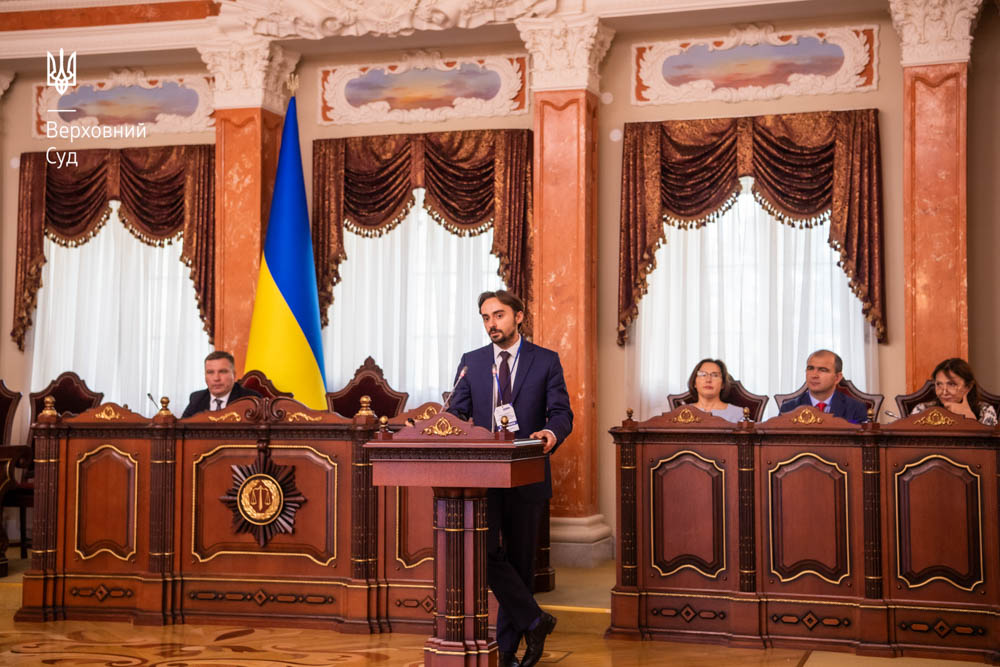
He noted that this document covers both the issues of Ukrainian procedural law and the issues of applicable international standards in terms of international conventions and foreign legislation. The speaker noted that the Recommendations are of an advisory nature only, but may be useful for judges, becoming a kind of guide that summarises existing practice and views of independent experts on problematic issues.
Oleksii Maslov said that the overall goal of the Recommendations is to uphold the rule of law. This is because in cases where the Russian Federation is the defendant, it is important to demonstrate that Ukraine, unlike the aggressor country, is a state governed by the rule of law. A more practical goal is to ensure that judgments in relevant cases can be recognised and enforced in foreign countries where the assets of the Russian Federation are mainly concentrated. One of the important aspects that will be studied by foreign judges is the issue of compliance with the standards of due process by Ukrainian courts.
Olena Skovorodina, President of the Commercial Court of the Donetsk region, spoke about certain aspects of the application of procedural law in cases involving entities affected by hostilities.
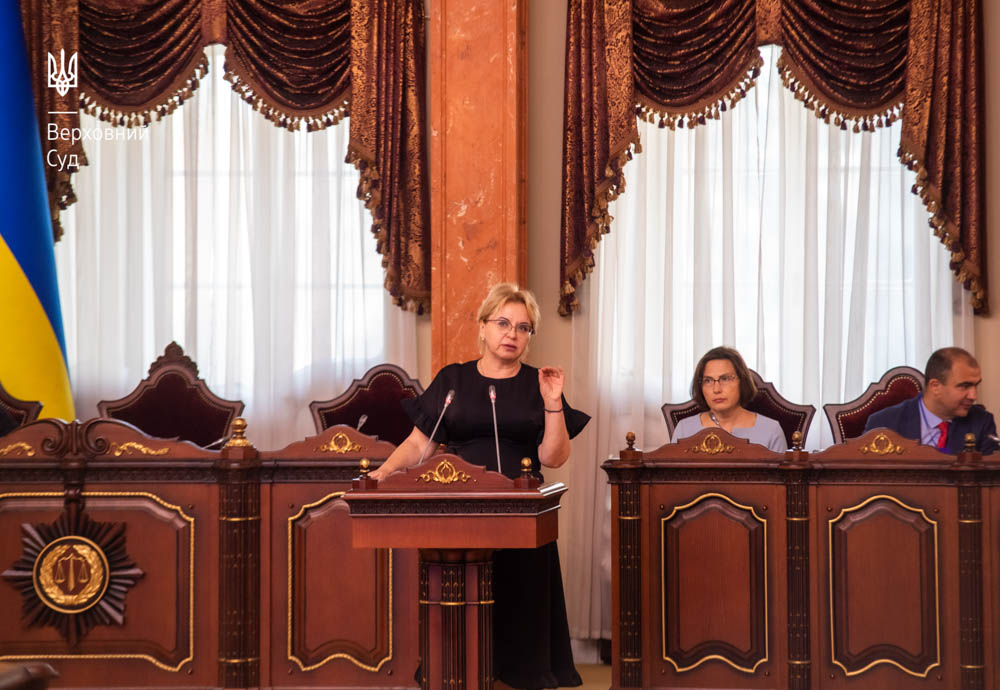
As never before, the war shows us that it is not the letter of the law, but the spirit of the law that should prevail in court decisions, she said. The spirit of the law should be applied first and foremost by judges of first instance and appellate courts. After all, they work with original documents, situations and events.
In addition, the speaker noted, the issue of withholding information in court decisions is an urgent one. The law only defines certain cases in which information about persons, vehicles, etc. is withheld. However, disputes may arise, for example, in relation to premises where military facilities are located. Information about such circumstances, as set out in a publicly available court decision, could put the military at risk, so it is worth considering how to resolve this situation.
The second panel of the conference discussed the practice of applying public law in war-related cases.
Judge of the Grand Chamber of the Supreme Court Yevheniia Usenko highlighted the legal opinions of the Supreme Court in cases involving military personnel.
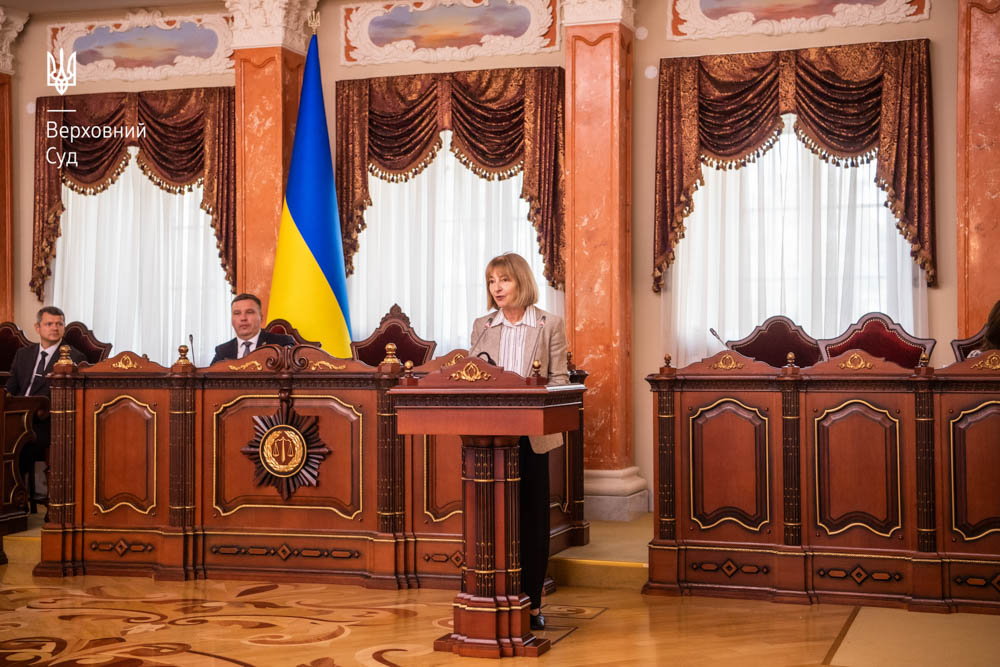
Thus, the judge drew attention to the decisions of the Supreme Court in exemplary cases on the payment of additional remuneration to an employee of the Judicial Protection Service, as provided for by Resolution of the Cabinet of Ministers of Ukraine No. 168 of 28 February 2022 ‘Issues of Certain Payments to Servicemen, Ranks and Commanders, Police Officers and Their Families During Martial Law’, as well as on the payment of such remuneration to servicemen seconded to state bodies, institutions and organisations.
Yevheniia Usenko also presented the position of the Grand Chamber of the Supreme Court regarding changes in the terms and conditions of pension provision for persons discharged from military service and analysed the conclusion on the jurisdiction of disputes related to military service, in particular, regarding social protection of military personnel.
For more details, see the presentation by Yevheniia Usenko: https://supreme.court.gov.ua/userfiles/media/new_folder_for_uploads/supreme/2024_prezent/Prezenr_prav_vusn_VP_ychast_viiskov_20_09_2024.pdf.
Andrii Zhuk, Judge of the Administrative Cassation Court of the Supreme Court, spoke about the peculiarities of law enforcement in cases of financial support for military personnel and in cases of appealing against decisions of territorial centres for recruitment and social support during the martial law regime.
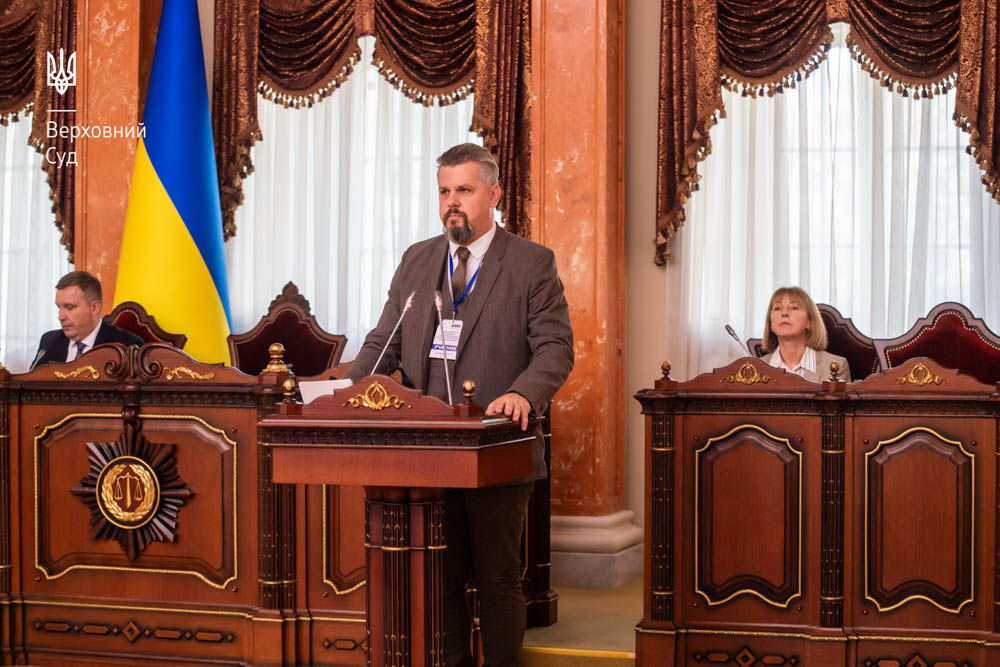
He noted that the lion's share of the cases currently being considered by the administrative courts relate to military service, mobilisation, payment of additional remuneration to servicemen and dismissal from military service. In deciding such cases, the courts try to strike a balance between the rights of each serviceman and the public interest that exists in our country at this difficult time.
The judge drew attention to the resolution of the Administrative Cassation Court of the Supreme Court of 18 January 2024 in case No. 280/6033/22, which concluded on the powers of the Territorial Recruitment Centre to call up persons liable for military service during a special period and the duties of persons liable for military service.
The speaker analysed the resolution of the Administrative Cassation Court of the Supreme Court of 11 April 2024 in case No. 520/7954/22, which made several important legal conclusions, in particular:
Andrii Zhuk also analysed the practice of the Supreme Court regarding the financial support of conscripts and the payment of additional remuneration, dismissal from military service, etc.
The presentation by Andrii Zhuk is available at https://supreme.court.gov.ua/userfiles/media/new_folder_for_uploads/supreme/2024_prezent/Prezent_Pravozast_grosh_zabezpec_viiskov_stan_20_09_2024.pdf.
Vasyl Kliuchkovych, Vice President of the Sixth Administrative Court of Appeal, reported on the case law on appeals against decisions of the Territorial Centre for Recruitment and Social Support, on administrative liability for violations of the legislation on defence, mobilisation training and mobilisation, and on cases of guaranteed provision of defence needs.
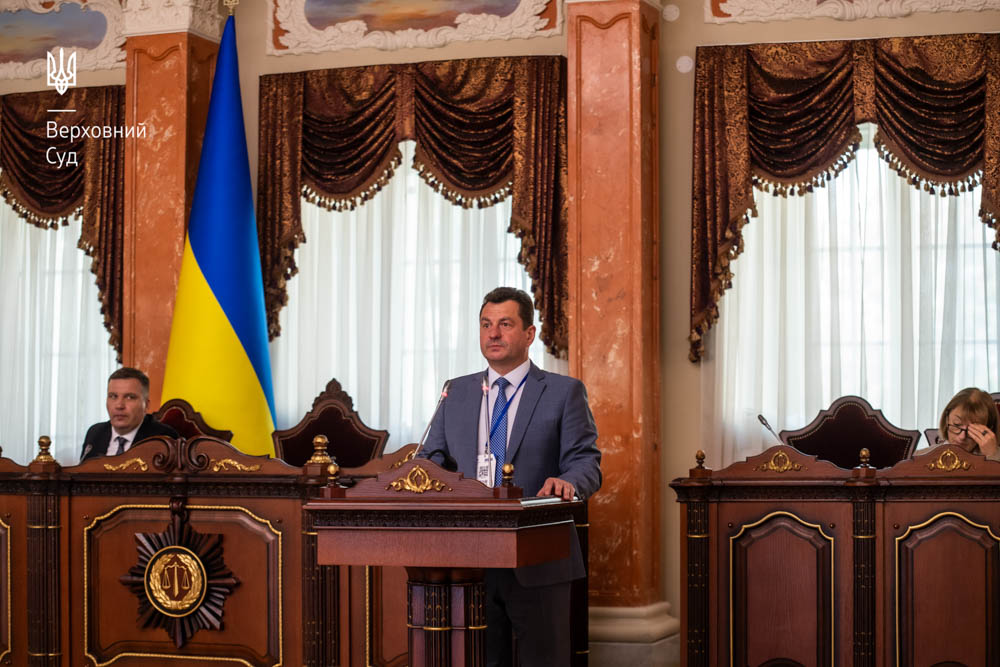
In particular, the judge provided statistical data on the number of cases and materials of this category considered by the Sixth Administrative Court of Appeal.
Vasyl Kliuchkovych drew attention to the new version of Art. 210-1 of the Code of Ukraine on Administrative Offences, which improves the liability for violation of the rules of military registration and legislation on defence, preparation for mobilisation and mobilisation.
The judge gave an example of a case in which a citizen appealed against a decision to impose a fine. The person had started a professional higher education, but did not report the change in his credentials and did not appear at the Territorial Centre for Recruitment and Social Support, so he was taken to court.
The court of first instance dismissed the individual's appeal against the decision to impose a fine, and the court of appeal upheld the decision. In its decision, the court stated that the plaintiff had failed to fulfil his obligation as a person liable for military service and had not updated his military registration data at the Territorial Centre for Recruitment and Social Support, and had therefore been lawfully brought to administrative liability.
In another case, the court overturned the decision of the Territorial Centre for Recruitment and Social Support because the person had failed to report for military service. The court of first instance dismissed the claim. In reviewing the case, the court of appeal pointed out that the person had submitted all the documents proving that he had the appropriate religion and had requested that he be offered alternative military service on the basis of his religious beliefs, but that this had been ignored. The court overturned the decision and closed the case.
Presentation by Vasyl Kliuchkovych - https://supreme.court.gov.ua/userfiles/media/new_folder_for_uploads/supreme/2024_prezent/Prezen_oskar_rish_TCK_20_09_2024.pdf.
The third discussion panel of the judicial and practical conference focused on the consideration of war-related criminal proceedings.
The panel began with a presentation by Mykola Mazur, Judge of the Grand Chamber of the Supreme Court, on the role of the Supreme Court's Grand Chamber in ensuring the unity of case law on international crimes.
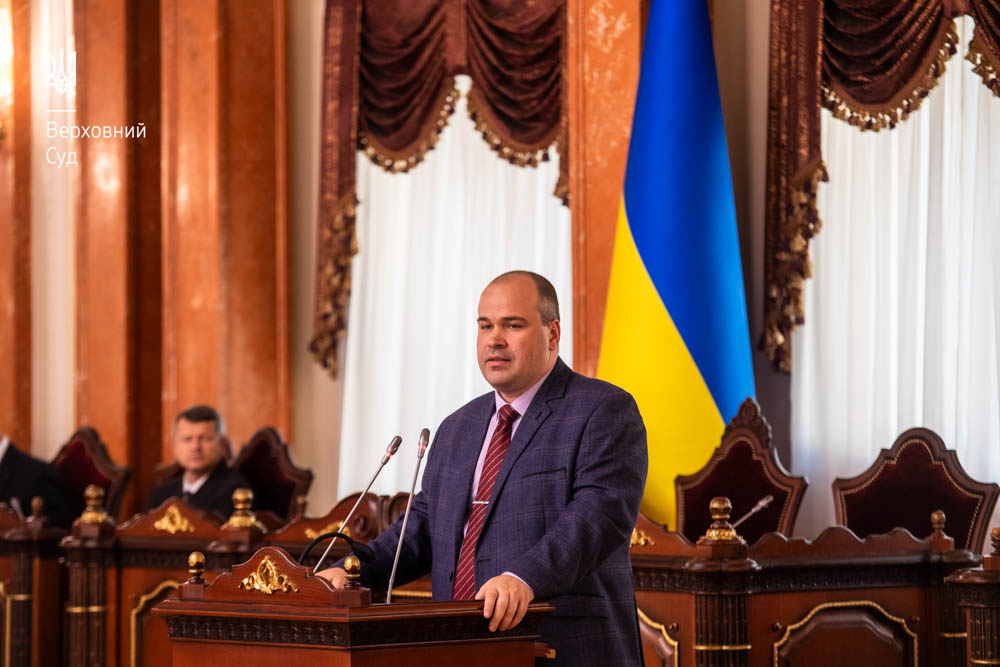
The judge drew attention to the resolution of the Supreme Court's Grand Chamber, which disclosed the elements of the crimes under Articles 437 and 438 of the Criminal Code of Ukraine.
Mykola Mazur noted that the interpretation of the content of the acts referred to in Article 437 of the Criminal Code of Ukraine at the national level has a certain level of autonomy from the interpretation in international law.
The Grand Chamber of the Supreme Court concluded that this crime is of a leadership nature. Thus, the acts defined in Art. 437 of the Criminal Code of Ukraine can be committed by persons who, by virtue of their official authority or actual social position, are able to exercise effective control over or manage political or military actions and/or significantly influence political, military, economic, financial, informational and other processes in their own country or abroad, and/or manage specific areas of political or military actions.
The judge also emphasised that in this case, the Grand Chamber of the Supreme Court concluded that the actions committed in the context of an armed conflict, which are covered by the prohibitions established by international humanitarian law and constitute a serious violation of them, are qualified only under Article 438 of the Criminal Code of Ukraine and do not require additional legal assessment under other articles of this Code.
Mykola Mazur added that the Grand Chamber of the Supreme Court drew attention to the fact that although the current Criminal Procedure Code of Ukraine does not provide for a retrial at the request of a person convicted in his or her absence, the current Criminal Procedure Code does contain a special provision allowing such a verdict to be reviewed by the court of appeal on both legal and factual issues, which, with proper judicial practice, can ensure compliance with European standards of the right to a fair trial.
Mykola Mazur's presentation is available at https://supreme.court.gov.ua/userfiles/media/new_folder_for_uploads/supreme/2024_prezent/Prezent_rol_VP_20_09_2024.pdf.
Nataliia Marchuk, Judge of the Criminal Cassation Court of the Supreme Court, in her report highlighted the current case law of the CrimCC of the Supreme Court in criminal proceedings under Articles 438, 111 and 110 of the Criminal Code of Ukraine.
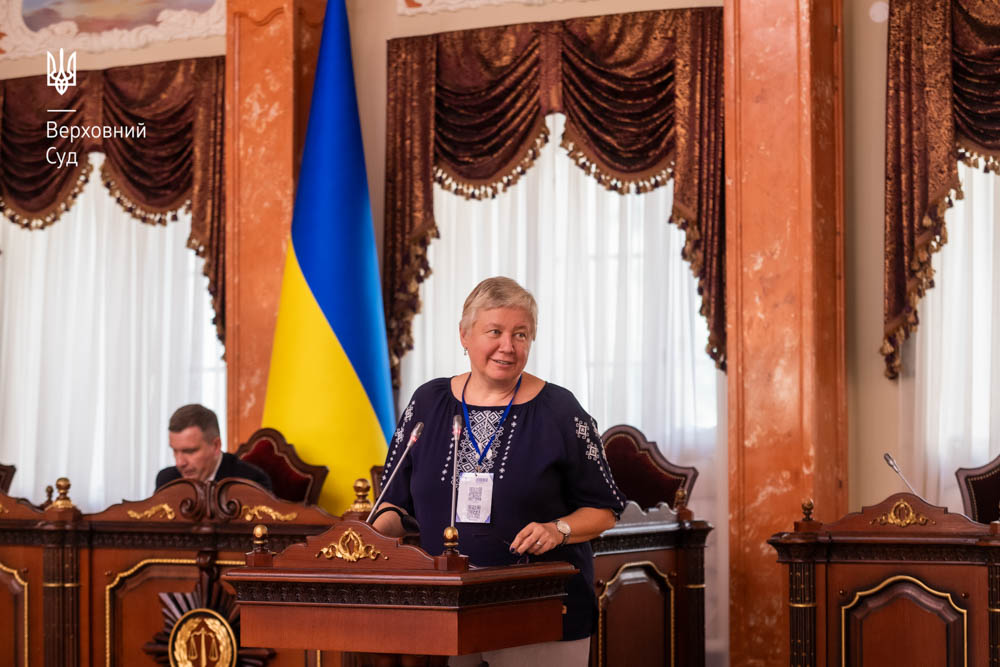
In particular, the judge drew attention to the verdict in the case of a native of the Autonomous Republic of Crimea who, as a military commissar, conducted forced conscription of the civilian population of Ukraine in the occupied peninsula, and whose actions were qualified under Article 438 of the Criminal Code of Ukraine. The panel of judges of the CrimCC of the Supreme Court concluded that the civilian population has been protected by the Geneva Convention since the day of the temporary occupation of the Russian Federation. The occupying power cannot force protected persons to serve in its armed or auxiliary forces. At the same time, any pressure or propaganda aimed at ensuring voluntary enlistment is prohibited.
In her speech, Nataliia Marchuk also spoke about the decision of the CrimCC of the Supreme Court, which upheld the verdict against the former judge, finding her guilty of committing a crime under Article 111 of the Criminal Code of Ukraine. The convicted woman had not been dismissed from her position as a judge under Ukrainian law and was administering 'justice' in the occupied territory of Ukraine on behalf of the Russian Federation. The speaker stressed that a person may not support the political regime of the country in which he or she resides or be employed there, but he or she does not have the right to harm the sovereignty and territorial integrity of Ukraine or to provide any assistance to a foreign state in conducting subversive activities against Ukraine.
In addition, the judge cited the position of the CrimCC of the Supreme Court in criminal proceedings regarding the encroachment on the territorial integrity and inviolability of Ukraine. The convicted person took part in broadcasts on the radio station in the occupied territories and during the conversations repeatedly publicly called on an unspecified number of listeners to change the borders of the territory or state of Ukraine.
The court of cassation noted that in the circumstances of this criminal proceeding, the essence of the statements was important, which consisted of incitement to activities aimed, inter alia, at changing the boundaries of the territory and state border of Ukraine by separating the territories of the western Ukrainian regions and transferring them to the possession of other states.
In another case, a person, being a deputy of the State Duma of the Russian Federation, was convicted in absentia for encroachment on the territorial integrity and inviolability of Ukraine. The Supreme Court concluded that since measures had been taken during the pre-trial investigation to inform him of the criminal proceedings against him, the trial was conducted in a special court procedure in accordance with the requirements of Article 323 of the Criminal Procedure Code of Ukraine.
For more details, see Nataliia Marchuk's presentation : - https://supreme.court.gov.ua/userfiles/media/new_folder_for_uploads/supreme/2024_prezent/Prezent_sud_prakt_KKS_spravu_Viina_20_09_2024.pdf.
Sofiia Danyliv, Judge of the Krasnoarmiyskyi City District Court of the Donetsk region, highlighted the peculiarities of the application of certain procedural rules in criminal proceedings under martial law.
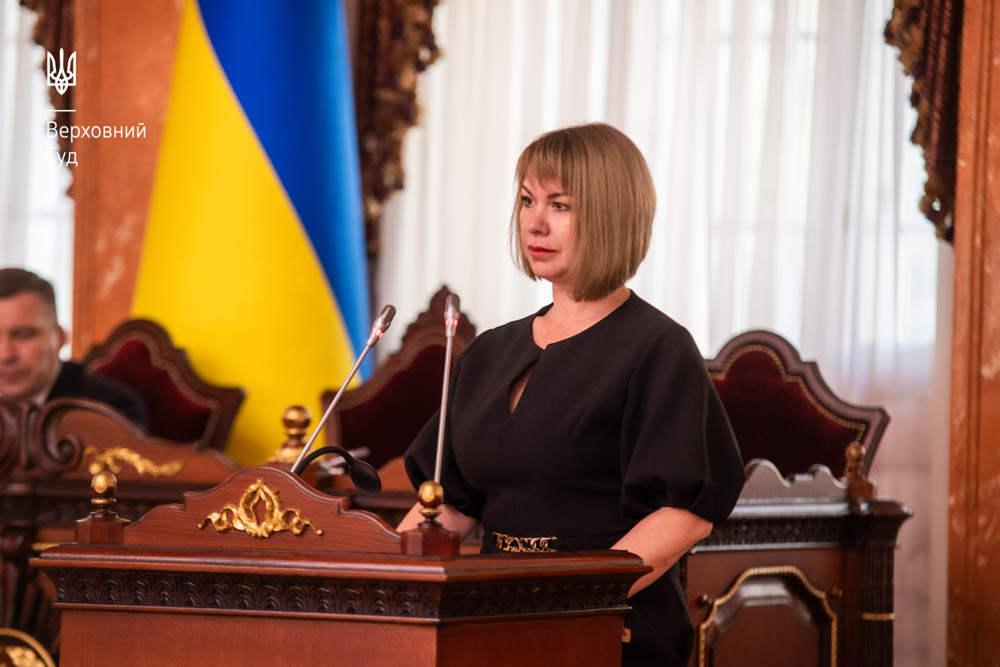
The speaker outlined the problems faced by investigating judges from the frontline areas in applying the rules of criminal procedure when deciding on applications from pre-trial investigation bodies.
In particular, due to the lack of postal communication, electricity and other negative factors caused by the proximity to the front line, there are difficulties in the application of measures to ensure criminal proceedings.
The judge noted that under martial law, the pre-trial investigation authorities have the right under Article 615 of the Criminal Procedure Code of Ukraine to record witness interrogations using available video recording equipment, but this right is not used in practice.
The presentation by Sofiia Danyliv is available at https://supreme.court.gov.ua/userfiles/media/new_folder_for_uploads/supreme/2024_prezent/Prezent_osobl_zastos_proc_norm_voen_stan_20_09_2024.pdf.